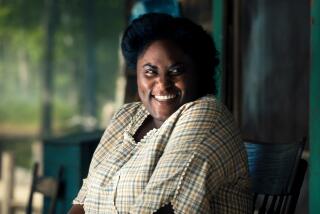Tony nominations’ heart is with ‘Kinky Boots,’ ‘Matilda’

NEW YORK — About seven years ago, the Broadway producer Daryl Roth saw an oddball British movie called “Kinky Boots,” about a struggling shoemaker who turns to the fetish-footwear business, and had a flash of inspiration.
“Not everyone I talked to believed it could work as a Broadway musical,” she said with a laugh on Tuesday. “But the movie had what I thought could be a really good blend: a very different world than many people knew but a lot of heart that they could relate to.”
On Tuesday, Roth’s outlier thinking was validated. With a book by Harvey Fierstein and a score by Cyndi Lauper, the stage adaptation of “Kinky Boots” received 13 Tony Award nominations, more than any other show, including one for best musical.
PHOTOS: 2013 Tonys top nominees
Roth’s comments prove an apt description not only of her show but of the larger Tony field, which Broadway veterans noted Tuesday contained a thread of the idiosyncratic but was still largely accessible. If there were few Disney-style blockbusters, there was also little “Book of Mormon”-style subversiveness among this Tony crop.
“Matilda, the Musical,” the adaptation of the Roald Dahl novel about a British boarding school run by a fearsome headmistress named Miss Trunchbull, picked up 12 nominations, also including best musical. Like “Kinky Boots,” say those involved with the show, “Matilda” walks a line between dark and uplifting.
“People ask me what audiences like about it,” said Bertie Carvel, the actor who, in drag, plays the Miss Trunchbull character. (He received a nomination for lead actor in a musical.) “And I say that while it is a dark show and there are some pretty dark things, it’s about how children view the world, and who can’t relate to that?”
The theme of the slightly challenging crowd pleaser held on the play side as well.
Nora Ephron’s final work, “Lucky Guy,” scored six nominations, including best play and leading actor in a play for Tom Hanks (his first Tony nomination), for its portrayal of the New York tabloid newspaper world through the character of the dying journalist Mike McAlary.
A fellow best play nominee, “Vanya and Sonia and Masha and Spike,” also picked up six nods, with a mix of comedy and drama. Christopher Durang’s work tells of sibling friction in a dysfunctional family in Bucks County, Pa.
Even arguably the most difficult work of the season, a revival of the brutal Edward Albee drama “Who’s Afraid of Virginia Woolf?,” had a degree of relatability.
“I think what works about our show is that no matter all the terrible things Martha and George say to each other, there is a love underneath that,” said Amy Morton of the play’s main characters. Morton landed a leading actress in a play nomination.
The Tony committee felt similarly: It handed the show five nominations, including best revival of a play.
The relatability has paid dividends at the box office. Though a number of weeks this year have lagged behind corresponding weeks of a record-setting 2012, when total receipts hit $1.14 billion, returns have still been strong, fueled particularly by new shows such as “Matilda,” “Lucky Guy” and “Motown: The Musical.”
But if the Tony committee was happy to go for accessibility in subject matter, it shied away from that when it came to actors. Well-known Hollywood names were overlooked in the acting categories, including Bette Midler (“I’ll Eat You Last”), Al Pacino (“Glengarry Glen Ross”) and Alec Baldwin (“Orphans”).
The season was marked by a supposed lack of original ideas. The first part of the season, in the fall, saw a host of revivals, many of which received tepid reviews and closed quickly. But the spring, when many of the most highly nominated shows opened, offered some relief.
“There is a lot that’s original out there,” Roth said. “But it’s not easy to do. It’s only easy after it becomes a hit.”
More to Read
The biggest entertainment stories
Get our big stories about Hollywood, film, television, music, arts, culture and more right in your inbox as soon as they publish.
You may occasionally receive promotional content from the Los Angeles Times.






